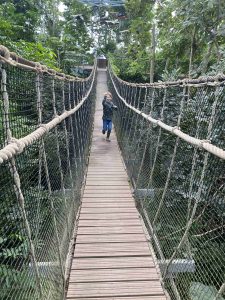Two distinct approaches to educating children outside the traditional school system—home education and world schooling—each offer unique benefits and challenges. In this article, I’ll share insights on both, highlighting their pros and cons. From our experience, both provide opportunities that traditional schooling simply cannot match.
For clarity, we practice home education rather than homeschooling. While homeschooling often follows a structured school curriculum from home and is a common term in the U.S. and other countries, home education in the UK allows for a more flexible, child-led learning approach based on individual interests and needs.
Home Education Overview
What is it? Home education is a choice where families take responsibility for their child’s learning outside of school. It allows children to focus on their interests and passions, applying knowledge to real-world situations. For example, instead of trigonometry, they might learn about mortgages and budgeting in math. Social interactions span various ages and backgrounds, and learning can be structured or spontaneous, depending on family values and children’s preferences. This approach fosters independence, curiosity, and the ability to learn in a way that suits the child best.



World Schooling Overview
What is it? World schooling involves educating children while travelling. Some families take a gap year, while others embrace it as a long-term lifestyle. By travelling to different countries—whether slowly immersing themselves in a new culture for months at a time or exploring many places quickly—children gain exposure to diverse languages, histories, and ways of life. Learning is organic, stemming from real-world experiences such as meeting locals, visiting historical sites, using different currencies, and engaging in cultural traditions. If structured learning is desired, online resources make it easy to cover academic subjects.



Pros of Home Education Over World Schooling
- Regular access to local groups – Enables children to develop skills and pursue activities, such as competitive sports, that require consistency.
- Stable friendships – Regular meet-ups help build long-term relationships and social skills.
- Routine – Beneficial for children who thrive on predictability and structure.
- Family connections – Allows frequent interaction with extended family members.
- Predictable budget – A set routine helps manage expenses efficiently.
- Access to healthcare – Easier to manage health concerns or special educational needs.
- Affordable off-peak travel – Home education allows for vacations during non-peak times.
- Local learning resources – Museums, libraries, and community centres provide accessible educational materials.
- Home-based resources – Supplies for science experiments, arts, and crafts are easily stored and available.



Cons of Home Education Over World Schooling
- Limited cultural and language exposure – Experiences remain largely within one country.
- Repetitive routine – Some families may find home education monotonous over time.
- Missed global experiences – Certain learning opportunities, such as seeing ancient ruins or experiencing different ways of life firsthand, aren’t easily recreated at home.
- Higher costs compared to some travel options – Depending on the country, maintaining a home base can be more expensive than long-term travel in lower-cost destinations.
- Less access to unique activities – World schooling provides exposure to one-of-a-kind experiences that aren’t available locally.
- Parental enthusiasm – Some parents (like me) feel more engaged when exploring new places alongside their children.
- Geographic limitations – Typically confined to a 20-mile radius rather than using the entire world as a classroom.



Our Approach: A Hybrid of Both
Rather than choosing one over the other, we blend home education with world schooling to create a lifestyle that works for our family. We provide our children with stability by regularly returning to our home base, allowing them to maintain friendships and progress in their activities. However, we also take them on extended trips, exposing them to new cultures and experiences.
Sometimes, we embrace slow travel, staying in one place for up to three months to immerse ourselves in the local culture and build connections. Other times, we opt for short, high-energy visits to explore as much as possible in a limited timeframe. This balance keeps our children engaged, happy, and thriving, while also fulfilling our own sense of adventure.

Why We Share This
We recognise that our lifestyle is different from the norm. Many families express dissatisfaction with their work-life balance, their children’s education, or the time they have together. We want to show families that there are alternatives—ways to design a life that brings joy, fulfilment, and meaningful experiences.
If you’re curious about how to create a life that aligns with your family’s values and dreams, we’d love to help! Sign up for our email list for insights, tips, and inspiration to start your journey toward a more intentional, fulfilling life.









 Adventure – Your style, your pace
Adventure – Your style, your pace Earning – Income your way
Earning – Income your way Education – Fit for your family
Education – Fit for your family
